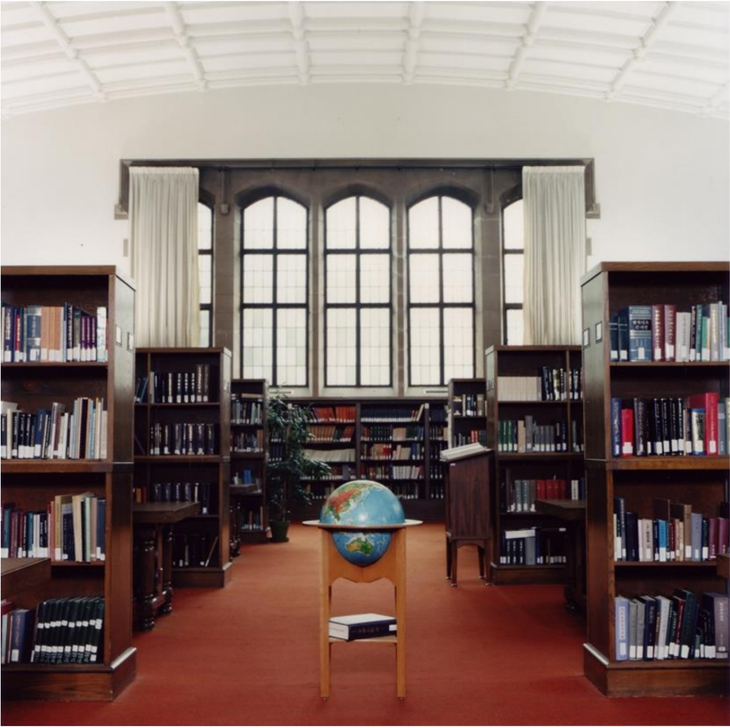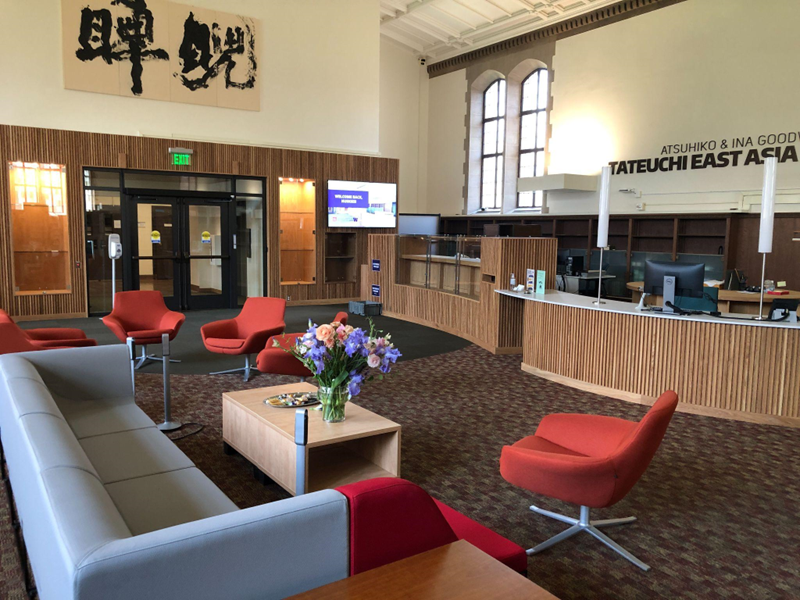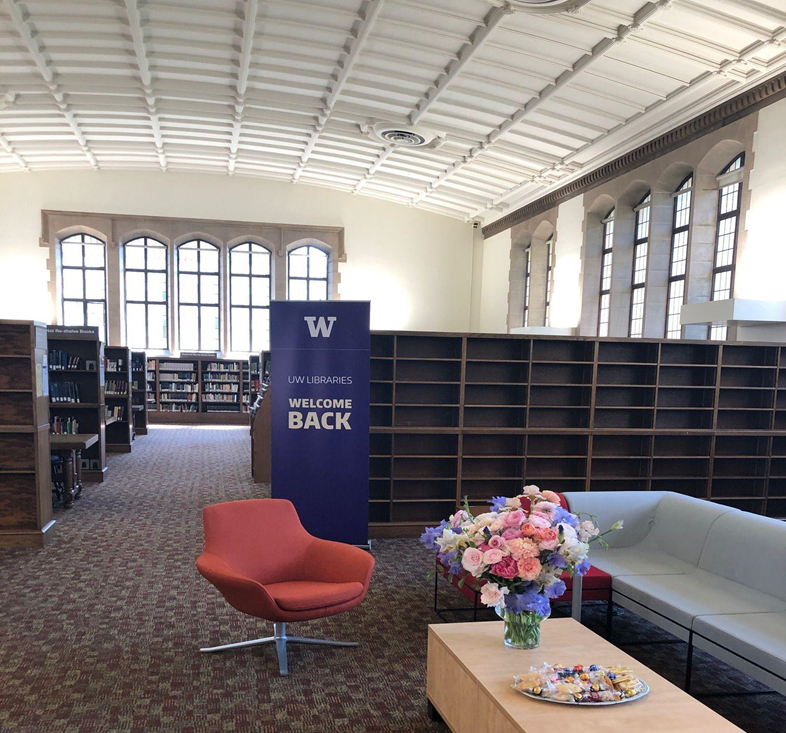By Hina Yu
NORTHWEST ASIAN WEEKLY
With the Tateuchi East Asia Library (the Tateuchi) at the University of Washington (UW) set for a grand reopening celebration on Feb. 21, after a two-year construction project, Zhijia Shen, now the director of Global Engagement, reflects on the transformative journey the library has undertaken. The library declared the renovation project as a way to “serve our community better.” It was an opportunity for the library to solidify their presence in their community.
Shen said there were three phases in the renovation. The first targeted the reading room, which is what the reopening will be focused on.

A picture of the George Beckmann Reading Room in the 1990s. (Photo from the University of Washington)
“We altered the entrance. Before, the entrance was not visible. Very few people knew we existed there,” Shen chuckled, “The new entrance opens up with glass doors, [so] everybody on the floor immediately will see the library.”

The new entrance to TEAL is made of glass doors, making it easier to find the library. A sofa and multiple chairs decorate the entrance to welcome visitors. (Photo by Zhijia Shen)
The second phase will concentrate on revamping staff areas by opening up space and adding more instruction and student group study spaces.
The third phase will involve stacks. Shen said, “It’s very old. We needed new furniture, light and also building space that suits today’s students’ needs, which is more collaboration and so on.”

The view of the newly renovated George Beckmann Reading Room upon entering the library. (Photo by Zhijia Shen)
The project was not without its challenges. The first was the budget.
“Especially when we were working on [the renovation project], the price went up daily. We budgeted $1.3 million for everything—the design, the pre-design, but it ended up costing more than $1.7 million. The price is a big challenge in Seattle. I think the future phases [of renovation] will have the same issues.”
Communication also posed a significant issue. Shen expressed regret over insufficient involvement of students and faculty throughout the project. While focus groups were formed prior to the project to gather opinions from faculty and students, there were no discussions during the project itself.
“This is their library. We librarians are the stewards of our students and faculty’s library,” Shen firmly declared. “They’re opening up crucial [paths to our success because they know what they need.” The Tateuchi’s renovation project was always for students and faculty..
The final obstacle was fundraising. Unlike budgeting, fundraising is the process of collecting money to proceed with the project. Fundraising has to be successful for budgeting the Tateuchi’s renovation projects. Shen elaborated that finding like-minded donors were important to “communicate your vision successfully.”
In 2020, the library received a gift of $6 million from the Atsuhiko and Ina Goodwin Tateuchi Foundation. In recognition of this gift, the library was renamed the Atsuhiko and Ina Goodwin Tateuchi East Asia Library. A portion of this gift provided significant funding for the renovation.
Serving the community has always been the Tateuchi’s vision. The library’s goal was to “create a 21st century library to support modern academic and community needs, including access to both digital and traditional resources” while retaining and honoring the historical and architectural settings. Shen mentioned the significant expansion of the library’s digital collection since her recruitment as director in 2006.
“When I first came, there were so few electronic resources. And now, the growth of our electronic resource is very significant compared to the overall growth of the collection; 50% of the growth is electronic.”
It took the Tateuchi many years to grow a collection of this size. As a foreign language library, the Tateuchi collected Chinese, Japanese and Korean language materials along with other languages like Manchu, Mongolian, Tibetan and more. Shen believed the library was able to expand the collection and services through strong leadership.
“To develop a library like ours here, it really needs stronger leadership [for someone] to see the potential of this library and its impact on the University, on students and the community.”
Shen said the Tateuchi is blessed in its location. Seattle, being the closest city by sea to Asia, is home to large Asian communities living in Seattle.
In her role as director of the Tateuchi, Shen worked to bridge the gap between the library and its immediate and surrounding communities.
“We developed a very active community outreach program, and we built very close ties with our local communities and our campus community—the faculty and students. I remember when I first came, the university was talking about how UW needs to get out of the Ivory Tower. We are a public institution; we need to really work with our community to serve [them] as well. I was very impressed with that.”
Shen added, “I firmly believe that it is part of our responsibility to serve our citizens. I also believe that we need to reach out even more nationally and internationally because our library enjoys close to 90 years of history. We developed a very strong collection, and many of those materials are unique and not available for people at other places.”
Out of all the accomplishments made for the library, Shen takes the most pride in the Tateuchi’s catalog. In her first year at the Tateuchi, the library had over 80,000 titles in the backlog, waiting to be cataloged. Although faculty could request access to the backlog, “nobody knew we had those” beyond campus.
“Our dean [of University Libraries] at that time organized the committee…the committee estimated $2 million to finish cataloging this,” and a minimum of 20 years to complete all the cataloging. Shen and her team started the work in 2008, but completed it in 2022— six years sooner than projected. This long-term task received praise and support from East Asian communities in Seattle. Backlogs written in Japanese, Korean and Chinese were funded by their respective communities and various grants.
“The Tateuchi Foundation gave [the library] over $400,000. That’s the first group of materials we finished. We had a Korean cataloger that put down $50,000 with the goal of raising $100,000.” The remaining $50,000 goal was met with support from Seattle’s very active Korean community.
Completing the Japanese and Korean cataloging backlogs were immense achievements on their own, but Shen recalled that finishing the Chinese backlogs was definitely the most challenging.
“There were more, so many more books.” On top of the amount of Chinese backlogs the library possessed, many were fragile, needing special preservation treatment. Additionally, there was a lack of information for many of these backlogs.
“You don’t know who published it, or even what date, but we still managed to finish.” Shen believes that completing all the cataloging for the backlogs have contributed to an increased community interaction.
“Over the years I’ve been here, we’ve made our library more visible, more active and contributing member to not only the UW community, but to the local community.
Shen said their vision extends beyond regional boundaries.
“We consider ourselves part of the Pacific world. The East Asia Library is crucial in this vision.”




Great article. Good to know more about UW.
👍👍
Nice article, excited to see the renovations!
Nicely written article!
Excellent information! Great to hear UW is making inclusive changes!
Great article!